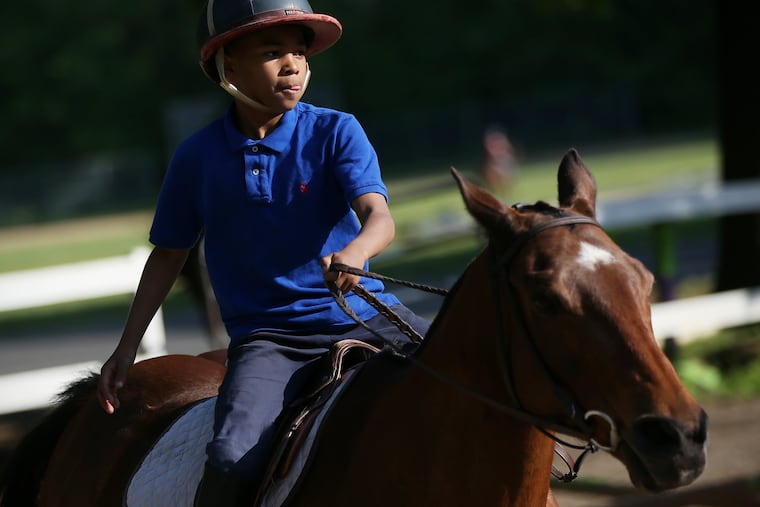Inside Work to Ride, the Philly nonprofit producing polo stars
The nonprofit teaches equestrian sports, but it also teaches life skills. Current and former students from their program recently modeled for Polo Ralph Lauren.

Inside the barn, it was almost time to ride. Four boys carefully got ready, fastening saddles to their horses, then mounting them. In this corner of Fairmount Park sits the Chamounix Equestrian Center. Many Philadelphians don’t know it’s there. But to the students of Work to Ride, a nonprofit that uses horsemanship to teach life lessons, it’s a second home.
The riders, ages 8 to 18, headed outside. Lezlie Hiner, the program’s leader and founder, wasn’t far behind. As students did laps on horseback, Hiner sat under the shade of the tree, watching. Dust swirled over her, floating as the pounding hooves drew close. It wasn’t a polo practice; they were really just giving the horses some exercise, but that wouldn’t stop Hiner from watching for form.
“Hands down at your side,” she called out to one student. “You’re not plucking chickens.”
With kindness and with wisecracks, Hiner molds kids from young riders to standout polo players. While many Philadelphia families share concerns around a lack of open locations for play and its physical benefits, Work to Ride’s base is a bright spot. Its polo program has 10 athletes, who can’t compete without at least a C average. Participants, all kids from underserved communities, learn equestrian skills and travel together for their sports, with the expectation that they keep the barn up, maintain the grounds, and tend to the center’s 35 horses.
“It gives you the opportunity, but it also makes you work for it,” said program alumna Shariah Harris, the first black woman to play top-tier polo. “That’s why I think so many of us have been successful.”
Current and former students say that through wanting to ride, they learn care — and, with that, responsibility. These lessons for Julián Penados, an 18-year-old enrollee from Mount Airy, are clear. In polo, an excellent athlete won’t be much on the field without a healthy horse. Penados fondly recalled that last year, Work to Ride members got to compete against Adolfo Cambiaso and Facundo Pieres, global polo superstars, in an exhibition.
“It’s up to us to keep the horses in tip-top shape, so they can perform to the fullest extent,” he explained, after washing Teresita, the horse he rode.
Work to Ride students and alumni recently modeled for a Polo Ralph Lauren campaign, shot on their home turf at Chamounix. For the nonprofit, Ralph Lauren has created a scholarship grant, but also gifted the kids with some fresh apparel, of course. Esteban Penados, Julián’s 16-year-old brother, said that what they do often takes a lot of explaining: “Nobody plays polo around here except for here.”
When founding the program in 1994, Hiner drew from what she learned about animal therapy while pursuing a psychology degree, hoping to carve a niche that combined her love of horses with a means to give back. Diversity in polo is unusual on U.S. soil. Hiner’s program has made national headlines for producing trailblazers. In 2011, theirs was the first black team to win at the United States Polo Association (USPA) National Interscholastic Championship.
Who plays on polo grounds has been shaped more by financial exclusivity than racism, said Madison Richardson, a retired polo player and expert who’s working on a book about African Americans in the sport. Since high-level horses cost from five to six figures to purchase, Richardson explained, the costs for horsepower, not to mention entering a club and mounting a team, are exorbitant. (In 2015, Forbes reported that assembling a top-tier team carried the “suggested cost” of $1 million to $3 million for just a winter season.)
“They didn’t have to set rigid barriers [over race]," Richardson said, "because the economics served that purpose.”
The cost to maintain Work to Ride’s horses is upwards of $400,000 per year, said Kareem Rosser, a program alumnus who now leads the Friends of Work to Ride. Rosser said the group is working toward “building an endowment that can ultimately fund the operation.”
Daymar Rosser, brother to Kareem, also came through the polo program. The sport has taken him up and down the East Coast, but also across the Atlantic, to England and Nigeria.
“Polo has been my passport around the world pretty much,” he said. “It all starts and it all begins with the Work to Ride program.”